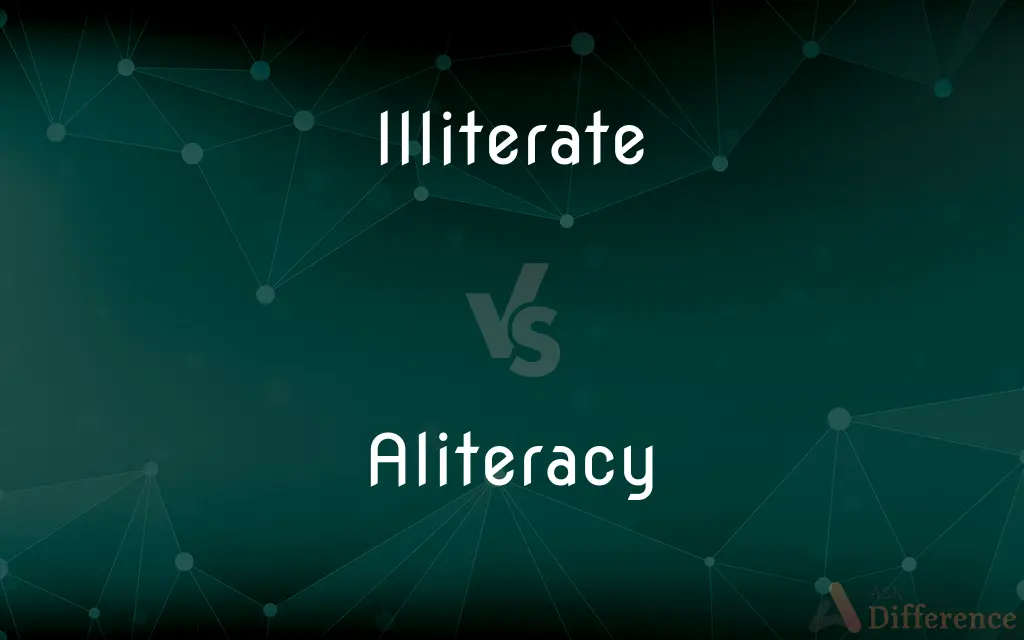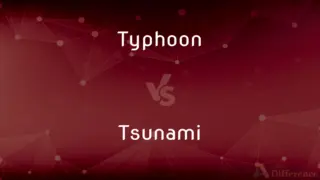Illiterate vs. Aliteracy — What's the Difference?
By Maham Liaqat & Fiza Rafique — Updated on March 14, 2024
Illiterate refers to the inability to read or write, while aliteracy describes the choice not to engage in reading.

Difference Between Illiterate and Aliteracy
Table of Contents
ADVERTISEMENT
Key Differences
Illiteracy is primarily defined by a person's lack of ability to read and write in any language. This is often due to lack of education or opportunities. On the other hand, aliteracy refers to individuals who possess the ability to read but choose not to for various reasons, such as lack of interest or preference for other forms of media.
While illiteracy is considered a significant educational and social issue, impacting an individual's ability to perform daily tasks and access information, aliteracy is seen more as a personal choice rather than an educational deficit. Aliterate individuals might still consume information through audio or visual media.
The causes of illiteracy often include socio-economic factors, such as poverty, inadequate schooling, and lack of access to educational resources. Whereas, aliteracy might stem from a saturated media environment, where the abundance of information and entertainment options leads individuals to opt out of reading.
Efforts to combat illiteracy typically involve educational programs, literacy campaigns, and policy interventions aimed at increasing access to education and improving educational quality. In contrast, addressing aliteracy might involve promoting the benefits of reading, creating engaging reading material, and integrating reading into popular culture.
Illiteracy can have profound implications on an individual's economic opportunities, social integration, and personal development. Aliteracy, while less dire in its immediate consequences, might contribute to a superficial understanding of complex issues due to the lack of depth in non-written media.
ADVERTISEMENT
Comparison Chart
Definition
Inability to read or write.
Possesses the ability to read but chooses not to.
Cause
Often due to lack of education or opportunities.
Personal choice, influenced by media environment.
Implications
Economic and social limitations.
Potential superficial understanding of complex issues.
Solutions
Educational programs and literacy campaigns.
Promoting the benefits of reading and creating engaging reading material.
Perception
Viewed as an educational and social issue.
Seen as a personal choice or lifestyle preference.
Compare with Definitions
Illiterate
Uneducated or unschooled.
Illiterate populations often face economic hardships.
Aliteracy
Choosing other media over reading.
Aliterate individuals often prefer videos and podcasts.
Illiterate
Lacking cultural sophistication.
Despite his wealth, he was considered culturally illiterate.
Aliteracy
Disengaged from reading for pleasure.
Aliteracy is rising among students due to digital distractions.
Illiterate
Lacking knowledge in a specific area.
He's almost illiterate when it comes to technology.
Aliteracy
Possessing reading skills but not exercising them.
His aliteracy is a choice, not a lack of ability.
Illiterate
Showing a lack of education.
The note was written in an almost illiterate scrawl.
Aliteracy
Reflecting a lifestyle choice.
Aliteracy in some circles is seen as a badge of busyness.
Illiterate
Unable to read and write.
Aliteracy
Able to read but uninterested in reading.
Despite being a teacher, she's surprisingly aliterate.
Illiterate
Having little or no formal education.
Aliteracy
Aliteracy (sometimes spelled alliteracy) is the state of being able to read but being uninterested in doing so. This phenomenon has been reported on as a problem occurring separately from illiteracy, which is more common in the developing world, while aliteracy is primarily a problem in the developed world.
Illiterate
Marked by inferiority to an expected standard of familiarity with language and literature
An illiterate magazine.
Aliteracy
Able to read but not interested in reading. See Usage Note at literate.
Illiterate
Violating prescribed standards of speech or writing
A paragraph with several illiterate expressions.
Aliteracy
The state of having the ability to read, but lacking interest in doing so.
Illiterate
Ignorant of the fundamentals of a given art or branch of knowledge
Musically illiterate. See Usage Note at literate.
Illiterate
A person who is illiterate.
Illiterate
(used with a pl. verb) People who are illiterate, considered as a group.
Illiterate
Unable to read and write.
Illiterate
Having less than an expected standard of familiarity with language and literature, or having little formal education.
Illiterate
Not conforming to prescribed standards of speech or writing.
Illiterate
Ignorant in a specified way or about a specified subject.
Economically illiterate, emotionally illiterate
Illiterate
An illiterate person, one either not able to read and write or not knowing how.
Illiterate
A person ignorant about a given subject.
The government is run by business illiterates.
Illiterate
Unable to read or write; ignorant of letters or books; unlettered; uninstructed; uneducated; as, an illiterate man, or people.
Illiterate
A person unable to read
Illiterate
Not able to read or write
Illiterate
Ignorant of the fundamentals of a given art or branch of knowledge;
Ignorant of quantum mechanics
Musically illiterate
Common Curiosities
What is aliteracy?
Aliteracy is when a person can read but chooses not to, often due to lack of interest.
Can illiteracy be overcome?
Yes, through education and literacy programs, illiteracy can be overcome.
What causes illiteracy?
Causes include inadequate education, poverty, and lack of access to learning resources.
Is aliteracy a problem?
It can be, as it may lead to a lack of depth in understanding complex issues.
Can aliterate people read?
Yes, aliterate people have the ability to read but choose not to engage in it.
What are the effects of illiteracy?
Illiteracy can limit job opportunities, social integration, and access to information.
What leads to aliteracy?
Factors include a saturated media environment and a preference for other forms of entertainment.
What is illiteracy?
Illiteracy is the inability to read or write, often due to lack of education.
Are illiterate and aliterate people uneducated?
Illiterate people may lack formal education, whereas aliterate individuals might be well-educated but disinterested in reading.
How is illiteracy measured?
Illiteracy is often measured through literacy tests and educational assessments.
Is aliteracy a choice?
Yes, aliteracy is typically a personal choice rather than an educational limitation.
Share Your Discovery

Previous Comparison
Restaurant vs. Brasserie
Next Comparison
Typhoon vs. TsunamiAuthor Spotlight
Written by
Maham LiaqatCo-written by
Fiza RafiqueFiza Rafique is a skilled content writer at AskDifference.com, where she meticulously refines and enhances written pieces. Drawing from her vast editorial expertise, Fiza ensures clarity, accuracy, and precision in every article. Passionate about language, she continually seeks to elevate the quality of content for readers worldwide.














































